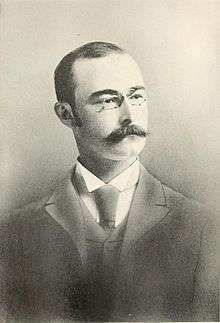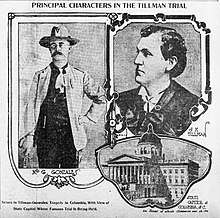Narciso Gener Gonzales
Narciso Gener Gonzales (August 5, 1858 – January 19, 1903) was born in Eddingsville, Edisto Island, South Carolina.[1] He and his brother, Ambrose E. Gonzales, were the founders of The State newspaper in the state capital, Columbia.
Narciso Gonzales | |
|---|---|
 | |
| Born | August 5, 1858 Edisto Island, South Carolina |
| Died | January 19, 1903 (aged 44) |
| Nationality | American |
| Occupation | Newspaper editor |
Family
Gonzales was the son of Confederate Colonel Ambrosio José Gonzales and Harriet Rutledge Elliott. His father played an instrumental role in the defenses of South Carolina during the American Civil War after he had been a Cuban revolutionary leader with Venezuelan General Narciso López, who opposed the oppressive Spanish rule in four failed expeditions. His mother was the daughter of a wealthy South Carolina rice planter, state senator, and writer, William Elliott.
Early life
Although his formal education ended at 17, he became a telegraph operator in 1875 to help support his extended family. He worked in railroad depots in Varnville, South Carolina, Savannah, Georgia, and Valdosta, Georgia. While he was a telegrapher and handled news reports, he developed an interest in journalism and state politics.
In 1880, he left the telegraph office in Valdosta to become a reporter for the Greenville, South Carolina, Daily News.[2]
While he worked in Varnville in 1876, he had written a report on a local uprising of plantation workers and telegraphed it to the Charleston, South Carolina, Journal of Commerce. That came to the attention of the editors of a rival newspaper, the Charleston News and Courier. Shortly after going to work for the Greenville Daily News, Gonzales accepted a position as the Columbia, South Carolina, correspondent for the News and Courier.
Founding of The State
In 1891, he and his brother Ambrose E. Gonzales (1857–1926) founded The State, a newspaper in Columbia, South Carolina. It supported a number of progressive causes; its editorials called for an end to lynching, the reform of child labor laws, and women's suffrage. The paper was also frequently critical of the policies of Benjamin Tillman, who had been elected governor of South Carolina in 1890.[3]

Death
He was shot on January 15, 1903, by South Carolina Lieutenant Governor James H. Tillman (nephew of Benjamin Tillman), the Lieutenant Governor, and died four days later. Tillman escaped punishment since the jury was considered to be rigged and highly partisan. Tillman had shot Gonzales in broad daylight in the presence of many eyewitnesses but was acquitted, ostensibly on a shaky self-defense theory but really because the jury believed Tillman to have been right in taking justice into his own hands. Gonzales had waged a crusade against Tillman in his newspaper that helped to ensure Tillman's defeat in the 1902 South Carolina governor's race.[4]
Legacy
A memorial cenotaph for Gonzales was later erected on Senate Street across from the State House in Columbia, purportedly on the route on which Tillman regularly walked home.
References
- Antonio Rafael de la Cova, Cuban Confederate Colonel: The Life of Ambrosio Jose Gonzales, Columbia, S.C.: University of South Carolina Press, 2003, 133.
- Jepsen, Thomas C., "Two 'Lightning Slingers' from South Carolina: The Telegraphic Careers of Ambrose and Narciso Gonzales." South Carolina Historical Magazine, October 1993, 271–275.
- Jones, Lewis Pinckney (1973). Stormy Petrel: N. G. Gonzales and His State. Columbia, S.C.: South Carolina Tricentennial Commission, University of South Carolina Press. pp. 109–285. ISBN 0-87249-253-2.
- Kantrowitz, Stephen (2015). Ben Tillman and the Reconstruction of White Supremacy. UNC Press Books.
Further reading
- Jones, Lewis Pinckney (1973). Stormy Petrel: N. G. Gonzales and His State. Columbia, S.C.: South Carolina Tricentennial Commission, University of South Carolina Press. ISBN 0-87249-253-2.
- Manuscripts Department Library of the University of North Carolina at Chapel Hill
- SOUTHERN HISTORICAL COLLECTION : #1009 ELLIOTT AND GONZALES FAMILY PAPERS http://www.lib.unc.edu/mss/inv/e/Elliott_and_Gonzales_Family.html